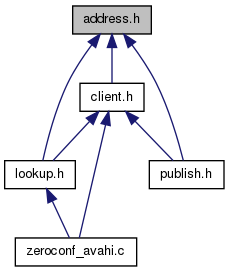

Go to the source code of this file.
Detailed Description
Definitions and functions to manipulate IP addresses.
Definition in file address.h.
Define Documentation
| #define AVAHI_ADDRESS_STR_MAX 40 /* IPv6 Max = 4*8 + 7 + 1 for NUL */ |
| #define AVAHI_IF_VALID | ( | ifindex | ) | (((ifindex) >= 0) || ((ifindex) == AVAHI_IF_UNSPEC)) |
| #define AVAHI_PROTO_VALID | ( | protocol | ) | (((protocol) == AVAHI_PROTO_INET) || ((protocol) == AVAHI_PROTO_INET6) || ((protocol) == AVAHI_PROTO_UNSPEC)) |
Typedef Documentation
| typedef struct AvahiAddress AvahiAddress |
Protocol (address family) independent address structure
| typedef int AvahiIfIndex |
| typedef struct AvahiIPv4Address AvahiIPv4Address |
An IPv4 address
| typedef struct AvahiIPv6Address AvahiIPv6Address |
An IPv6 address
Enumeration Type Documentation
| anonymous enum |
| anonymous enum |
Function Documentation
| int avahi_address_cmp | ( | const AvahiAddress * | a, |
| const AvahiAddress * | b | ||
| ) |
Compare two addresses. Returns 0 when equal, a negative value when a < b, a positive value when a > b.
| AvahiAddress* avahi_address_parse | ( | const char * | s, |
| AvahiProtocol | af, | ||
| AvahiAddress * | ret_addr | ||
| ) |
Convert the specified human readable character string to an address structure. Set af to AVAHI_UNSPEC for automatic address family detection.
| char* avahi_address_snprint | ( | char * | ret_s, |
| size_t | length, | ||
| const AvahiAddress * | a | ||
| ) |
Convert the specified address *a to a human readable character string, use AVAHI_ADDRESS_STR_MAX to allocate an array of the right size
| AvahiProtocol avahi_af_to_proto | ( | int | af | ) |
Map Unix AF_xxx constants to AVAHI_PROTO_xxx constants
| int avahi_proto_to_af | ( | AvahiProtocol | proto | ) |
Map AVAHI_PROTO_xxx constants to Unix AF_xxx constants
| const char* avahi_proto_to_string | ( | AvahiProtocol | proto | ) |
Return a textual representation of the specified protocol number. i.e. "IPv4", "IPv6" or "UNSPEC"
Variable Documentation
| AVAHI_C_DECL_BEGIN typedef int AvahiProtocol |